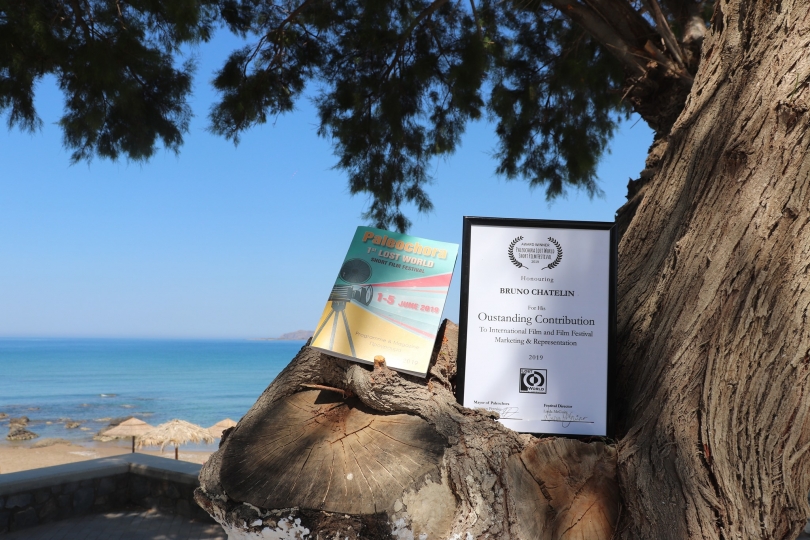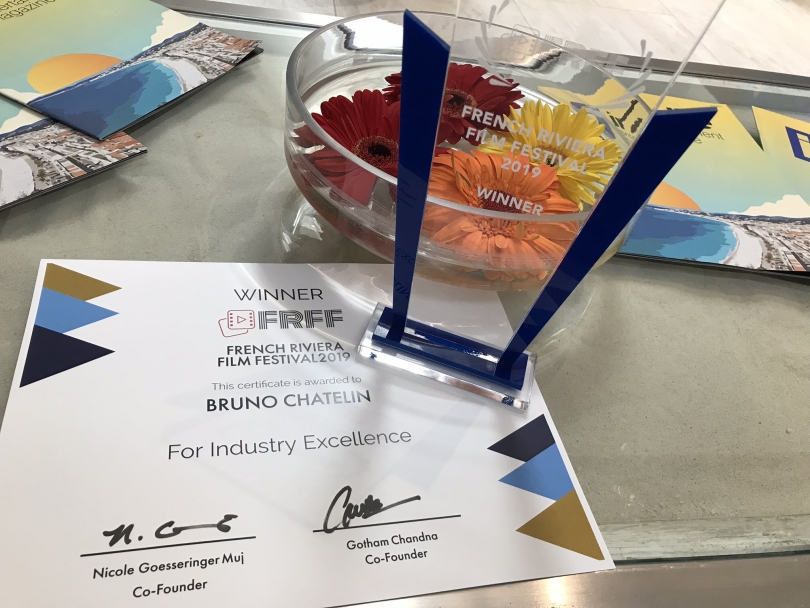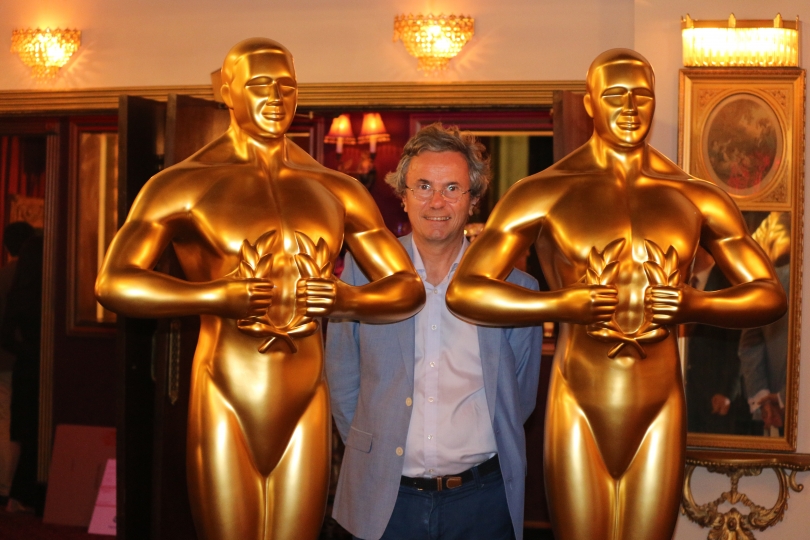Song Il-gon studied film in Poland and his unusual path has led him to an unusual
debut, Flower Island, a digital video road movie about three soul-wounded
women seeking solace in a mysterious "Flower Island". The low budget
film premiered at Venice and has travelled extensively around the festival circuit,
winning a Jury Special Mention recently at the Fribourg Festival. Filmfestivals.com
met director Song Il-gon at Rotterdam 2002.
You once said you felt bound to become a filmmaker…
(Smiles) Oh, I didn't feel destined to that extent! But when I look back upon
my life, I feel there is some power that moved me towards some destination.
I just followed a kind of destiny. It's like I just didn't have any other choice.
Do you come from a family of artists that influenced you or did you just
decide to follow your own path?
Actually, my mother is a poet and her books have been published. I think I
got a lot of influence from her. As a child, the thing I liked most was reading
books. And my mother offered me books all the time and I loved to read all kinds
of books, either European classics or children's books. As a teenager, I loved
to read Russian novelists like Dostoevsky, who was my favourite. So I think
I got some influence from European and Russian literature.
Did you write, do you like to write now as much as film?
Actually, no! (Laughs) I used to write everyday a kind of diary, so that was
my kind of literature. But I never wrote professionally. I just like to write
for leisure, what I think, what I feel.
So what actually propelled you towards the world of moving images?
I studied film in Korea, but I was not a film maniac. I just started to see
good, interesting films, like Fellini's, Bergman's, Tarkovski's or Kieslowski's,
Kurosawa's and Ozu's. So I started to really like those films, more than other
students did. I was really fascinated that films could be understood by everybody.
Whether you are French, American or Korean, the film language is universal and
can appeal to all. So I found there some possibility to communicate with different
persons, and that fascinated me.
Do you feel this overture to the outside world is something lacking in Korea
due to difficult historical circumstances?
I think so. Concerning my studies, ten years ago, when I was a student, I had
no idea how to communicate, how to talk to people through images. I just studied
films from the great masters. But then I went to study in Poland and that was
really when I found out that the film language could be universal. Before that,
I was in a very small world. Because even the film world can be small, if you
don't share the themes and situations inside this world with other people.
I found out that film offered great possibilities to communicate between Poland
and Korea, between Europe and Korea. So my whole idea about film could spread
out to the outside world. Even if I made only sounds and images without any
dialogues, people could understand. That's the power of images. Image can tell
more than words. Words are only a small part of the whole meaning of film.
You said that in Poland you had a very good documentary teacher…
Documentary and fiction. He really taught me how to communicate through images
and sounds, without dialogues. So it was a kind of revolution for me and it
was also a tough learning process. But it was a very important moment for me,
it changed my ideas about film.
After you film studies in Poland, you didn't go back immediately to Poland.
You made a film in Poland called Liver and Potato…
It was actually a film school film. I made two short films with 35mm. It was
still a kind of learning process to discover how to tell my stories to other
people who didn't understand Korean at all. For me it was a great challenge
to make them feel what I wanted to express, from one person to another person.
Also, I studied documentary, which is a very good way to observe people. Documentary
is very important in Polish film schools, and I learnt a lot from studying it.
And it was very important for me to make short films with 35mm and a very good
crew, a very good cameraman.
Back in Korea, you made a short film called Flush for the Seoul Video
Art Biennale, about a teenage girl committing abortion in a public toilet. I
heard this film caused quite a commotion…
Yes, it caused quite a shock. The Biennale invited me to make one video art
clip to be screened on electronic billboards. So I thought: "What can I
make?" In Korea, we have like 40 huge electronic billboards to screen commercials.
I was thinking, when I am walking or driving in Seoul, every time I see those
electronic advertisements. And in Korea, there is a very famous commercial with
a teenage girl showing beautiful images. For me, there is a lot irony in this,
because in Korea 15/16 year-old girls have a lot of problems, like abortion…
But it's still taboo to talk about abortion, isn't it?
Yes, they never talk about it. So the commercials just show beautiful girls
with beautiful images, and that's it. I thought it was a lie to sell products.
Then I read an article in a newspaper which said that in one month, there were
like three abortion cases in public toilets, with 15 year-old girls. So that's
big problem in Korea and I decided to show that, their pains, that it's not
their fault, it's the fault of society. And then the film was shown on the first
day of the Biennale on 42 electronic billboards. The government was surprised
and decided to censor the film immediately without even seeing it actually.
Originally, the film was to be shown for one month. I was so mad about it…
Before making the film, I actually showed the screenplay to the government and
told them what the film was about. But after making the film and screening it,
they just decided to censor it.
So is it a reason why in a way you put a Flush-like sequence at the
beginning of Flower Island?
Actually, the whole story of Flower Island comes from Flush,
from those abortion cases. And before that, I was thinking about making a road
movie about three women's journey. And I decided to make a film immediately
after the Flush experience.
In Flower Island and Flush, you show the abortion in an allegorical
way. Wings sprout on the girl's back…
Flush was a very short clip, 50 seconds exactly. I mixed realism and
fantasy. But it was still shocking for the audience. But also, in Flower
Island, the teenage character likes to craft things with her hands, like
paper wings. So those wings are her own wings in a way.
You made a film that feels quite different from the new Korean commercial
wave. It's a slow-moving road movie with three wounded female characters…
Yes, most Korean films are on the man's side, father's side. Men are often
the centre of the world in Korean films. And it seemed to me that there was
no film where the female characters were really the main focus. That's why I
wanted to come up against historical, traditional, conservative ways of thinking.
Indeed I am man, but I thought it was possible for me to make three women the
centre of my world…
Flower Island is not a feminist film. I just wanted to emphasize the
motherly side of things. Mothers are always in the shadow, behind men. So I
wanted the mother figure to convey the main atmosphere of my film. I can say
that those three different women can in fact be just one person, from adolescence
to adulthood, and the way her life and vision of life change through time. Also,
I didn't want to make just another conventional road movie. I wanted to break
many rules with that film… (Smiles)
How did the Korean audience react to the film?
It was a kind of mixed reaction. For instance, people from right wing magazines
didn't like the film… (Smiles) But the left wing voted Flower Island Best
Film in Korea last year. That's a huge gap, isn't it? (Smiles)
What was the festival reaction to the film?
The film premiered at Venice 2001. I was really touched by the audience because
they gave me and my actors a lot of encouraging reactions. They clapped for
5 minutes. The actresses were crying. You know, Flower Island was not
an easy film to finish, we had a very low budget. And it was very cold to shoot
in the mountains. Psychologically, the actresses had to feel the pains of the
characters all the time, so it was not easy at all… But after finishing
the film, we really appreciated showing it.
Is Flower Island real?
Yes, we have something like 6 Flower Islands in Korea. Korean people like to
put the word "flower" on many things: 'flower island', 'flower fire'…
'Flower Power'?
No, not 'Flower Power'! (Laughs) So I first went to a Flower Island, in the
south of Korea, 8 years ago. At that time, 60 people were living there. It was
a very secluded, dying island with no more children and young people. The inhabitants
of Flower Island left for the big cities. So there is no more hope this Flower
Island. But I stayed there for about two months and kept very beautiful memories
of that place. It's a far away place, it could be symbolic, it could be anywhere,
everywhere.
You made a film that is a road movie, a journey through Korea, from north
to south. Was the shooting also in any way like a journey?
Actually, yes. It took me only three days to write the script of Flower Island.
I felt that digital video offered a lot of possibilities, that I could get very
close to the characters with it. So I wrote only a simple draft, and then immediately,
I cast the three women and we rehearsed a lot, talked a lot about the characters.
And like the characters, we all had a journey from Seoul to the Flower Island,
which opened a lot of narrative possibilities. And the three actresses identified
with the characters already. So I was expecting a lot of things from them, I
trusted them and we just followed the characters in a way.
A word about the actresses. The eldest actress is, I heard, a theatre actress.
As to the younger actress who plays the cancer-afflicted singer, she is actually
a real singer and I read you spotted her in a Dracula musical…
Yes! (laughs) I met her by chance. She's a lyrical singer, not one of the best,
but a rising star. She had never played on stage or in movies, it was her first-time
experience. I talked to her, and thought her purity of soul was perfect for
the role. So she agreed to play in the film and sung herself the singing scenes.
Also, we took a three-day trip to Flower Island before the shooting, with the
actresses and one producer. And she really likes to sing all the time. So towards
the end of the film, I put a scene of her singing at the old school. I caught
this moment almost by accident.
As to the eldest actress, she is a very good theatre actress who has never
played in film. It was her first time also. She has an amazing talent to create
characters.
Who are your friends in the movie industry in Korea? Who do you associate
with?
Although I was in Poland for 5 years, between 25 and 30, I know many very good
young directors. Like Moon Seong-Wook, the director of Nabi the Butterfly,
a film that was in Locarno. He's my best companion, we knew each other 4 years
before going to Poland. We share a lot of ideas about film. We studied together,
supervised scripts together. I'm also friends with Jung Ji-woo, who made Happy
End, Yun Jong-chan, who made Sorum, and Lim Soon-rye who made Waikiki
Brothers. I feel it's a kind of golden age now, we are the same generation,
we studied in the same film school, we can share ideas. It's a good moment for
Korean cinema to show things abroad.
Do you feel related to older Korean directors?
Our generation didn't see many film from the sixties. We were greatly influenced
by America and European cinema. There's no cinematheque in Korea, but after
my film studies, I got interested in past Korean cinema, and how the history
of Korean cinema had been changed. I really like Im Kwon-taek's films. In the
seventies and eighties, there was a dictatorship and censorship was very strong,
directors couldn't express what they wanted to say. Now, I feel like I want
to go back to the roots of Korean cinema, because it's like something is missing
in the history of Korean cinema.
Robin Gatto

 Chatelin Bruno
Chatelin Bruno 














